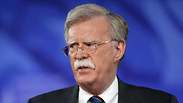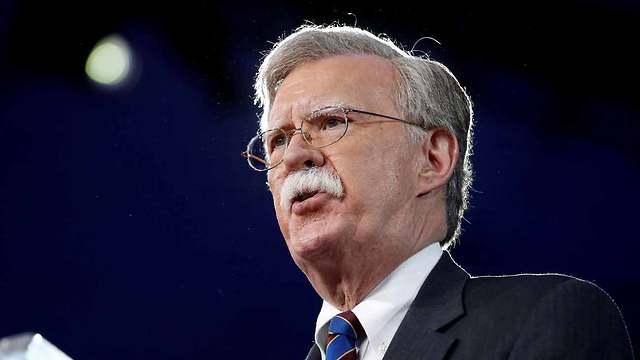
With friends like John Bolton, who needs enemies?
Op-ed: Americans who encourage Israel to launch wars, Americans who are trigger-happy when it comes to someone else’s trigger, don't really love us. And even if they do, it's negated by their prodding.
With friends like that, who needs enemies?
Speaking at a Yedioth Ahronoth conference in Jerusalem on Sunday, former IDF Chief of Staff and Defense Minister Shaul Mofaz recalled a conversation he had had in the past with the new adviser. “Why aren’t you attacking Iran?” Bolton protested, and Mofaz had to explain.

In the relatively small group of Americans involved in foreign policy, Bolton is an interesting exception. He is affiliated with the neoconservatives, a group of Republican thinkers that preaches active American involvement in the world, including preventive wars and initiated military operations against rebel states and terror organizations. Its founding generation crossed the line from the Left to the Right during the Vietnam War. It reached its highest level of influence during the term of President George W. Bush and his deputy, Dick Cheney, providing Bush with the justifications for the disastrous invasion of Iraq.
Most prominent neocons are pro-Israel Jews, including Bill Kristol, John Podhoretz, Robert Kagan and Elliot Abrams. People often confuse them with the Jewish lobby and blame Israel for the American entanglement in Iraq.
Bolton isn’t Jewish. He isn't as sophisticated as his colleagues in the neoconservative camp and he's much more blatant. When he served as the US ambassador to the UN, in the George W. Bush era, he was called the least diplomatic diplomat in the history of American diplomacy. He had one solution to every problem that came up: To launch a military operation—in Iraq, in Cuba, in North Korea, in Iran. He is one of the only people in the United States who still believe the invasion of Iraq was the right and justified thing to do.
The American Right is split in its attitude towards the global arena: The neocons are faced by the separatists, who are in favor of breaking alliances, walking away from international agreements, disregarding shared democratic values, launching trade wars and bringing America’s soldiers back home. Their attacks on the rival camp carried an anti-Semitic tone.
The failures in Afghanistan and in Iraq strengthened the separatists and pushed the neocons aside. Steve Bannon, who preaches separatism, faced Bill Kristol, who preaches intervention, and won. Bannon supported Donald Trump; Kristol endorsed Hillary Clinton.

During the presidential election campaign, Trump was the most radical separatist. He disparaged the foreign policy of the Republican Bush, just like his disparaged the Democratic Obama. “America First,” one of his two election slogans, was borrowed from the slogan of the movement which in the 1930s was against America joining the war against Nazi Germany.
In the year and a half that have passed since Trump won the elections, most of the senior White House staff has been replaced twice. Any attempt to provide ideological explanations for this reshuffle faces a contradiction. At the end of the day, it’s Trump and only Trump: His ego, his mood swings, his short fuse, his ignorance on everything that is happening in the world.
The last two appointments—of Mike Pompeo as the secretary of state and of John Bolton as the national security adviser—point, allegedly, to a change of approach. Two pragmatic senior officials have been dismissed; two warmongers have been appointed. The neocons have regained control of the foreign policy, big time. Pompeo and Bolton will lead the United States to a war against Iran.
But since it’s Trump we’re talking about here, nothing is certain. Perhaps he thinks that appointing two enemies of Iran will scare the ayatollahs and convince them to significantly improve the nuclear agreement; and perhaps he isn’t thinking at all. Even if he does withdraw from the nuclear agreement in less than two months, as Prime Minister Benjamin Netanyahu has advised him to do, that doesn’t guarantee that anything will change in the agreement. Trump will deliver a speech, and the Iranians—in full agreement with the Europeans—will find ways to keep implementing the agreement without suffering any damage.
I find it hard to believe that Americans who encourage Israel to launch wars, Americans who are trigger-happy when it comes to someone else’s trigger, really do love us. And even if they do, their love suffocates.










